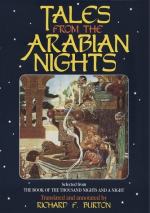[FN#52] A necessary precaution, for the headsman who would certainly lose his own head by overhaste.
[FN#53] The passage has also been rendered, “and rejoiced him by what he said” (Lane i, 600).
[FN#54] Arab. “Hurr"=noble, independent (opp. to ’Abd=a servile) often used to express animae nobilitas as in Acts xvii. 11; where the Beroeans were “more noble” than the Thessalonians. The Princess means that the Prince would not lie with her before marriage.
[FN#55] The Persian word is now naturalized as Anglo-Egypeian.
[FN#56] Arab. “khassat hu” = removed his testicles, gelded him.
[FN#57] Here ends the compound tale of Taj al-Muluk cum Aziz plus Azizah, and we return to the history of King Omar’s sons.
[FN#58] “Zibl” popularly pronounced Zabal, means “dung.” Khan is “Chief,” as has been noticed; “Zabbal,” which Torrens renders literally “dung-drawer,” is one who feeds the Hammam with bois-de-vache, etc.
[FN#59] i.e one who fights the Jihad or “Holy War”: it is equivalent to our “good knight.”
[FN#60] Arab. “Malik.” Azud al Daulah, a Sultan or regent under the Abbaside Caliph Al-Ta’i li ’llah (regn. A.H. 363-381) was the first to take the title of “Malik.” The latter in poetry is still written Malik.
[FN#61] A townlet on the Euphrates, in the “awwal Sham,” or frontier of Syria.
[FN#62] i.e., the son would look to that.
[FN#63] A characteristic touch of Arab pathos, tender and true.
[FN#64] Arab. “Mawarid” from “ward” = resorting to pool or water-pit (like those of “Gakdul”) for drinking, as opposed to “Sadr"=returning after having drunk at it. Hence the “Sadir” (part. act.) takes precedence of the “Warid” in Al-Hariri (Ass. of the Badawi).
[FN#65] One of the fountains of Paradise (Koran, chaps. Ixxvi.): the word lit. means “water flowing pleasantly down the throat.” The same chapter mentions “Zanjabil,” or the Ginger-fount, which to the Infidel mind unpleasantly suggests “ginger pop.”
[FN#66] Arab. “Takhil” = adorning with Kohl.
[FN#67] The allusions are far-fetched and obscure as in Scandinavian poetry. Mr. Payne (ii. 314) translates “Naml” by “net.” I understand the ant (swarm) creeping up the cheeks, a common simile for a young beard. The lovers are in the Laza (hell) of jealousy etc., yet feel in the Na’im (heaven) of love and robe in green, the hue of hope, each expecting to be the favoured one.
[FN#68] Arab. “Ukhuwan,” the classical term. There are two chamomiles, the white (Babunaj) and the yellow (Kaysun), these however are Syrian names and plants are differently called in almost every Province of Arabia
[FN#69] In nomadic life the parting of lovers happens so frequently that it become. a stock topic in poetry and often, as here, the lover complains of parting when he is not parted. But the gravamen lies in the word “Wasl” which may mean union, meeting, reunion Or coition. As Ka’ab ibn Zuhayr began his famous poem with “Su’ad hath departed,” 900 imitators (says Al-Siyuti) adopted the Nasib or address to the beloved and Su’ad came to signify a cruel, capricious mistress.




